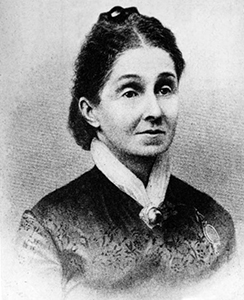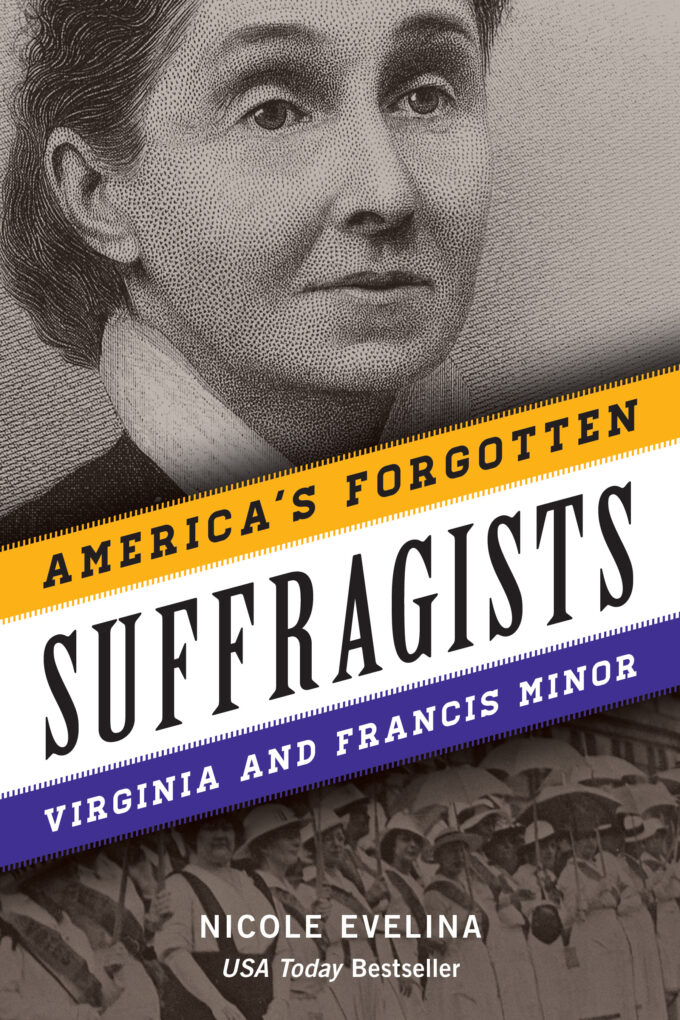Celebrating Virginia Louisa Minor
March 27, 1824–August 14, 1894
Virginia Louisa Minor was born in Caroline County, Virginia, on March 27, 1824, to Warner and Marie Timberlake Minor. Little is known about her early years and education. On August 31, 1843, she married her distant cousin, lawyer Francis Minor. They lived in Mississippi for a time, close to family members who had emigrated there, and then moved to St. Louis where a larger family group had settled. They bought a farm in St. Louis in what is now the Central West End in 1845. On February 8, 1852, Virginia and Francis had their only child, a son named Francis Gilmer Minor.
Although they came from wealthy southern families, Virginia and her husband supported the Union during the Civil War. At the outbreak of the war, she became an active member of the St. Louis Ladies Union Aid Society, which shortly became the largest branch of the Western Sanitary Commission. The successful management by women of the complex activities of the society—collecting and distributing clothing and supplies, staffing army hospitals, helping in the field, and even at the front—encouraged Virginia’s belief that women deserved political equity.
As early as 1865, when enfranchisement of former slaves was a topic of public debate, Virginia was the first woman in Missouri to suggest publicly that women be granted the vote. When her son died in a shooting accident in 1866, she decided to devote the rest of her life to women’s suffrage. On May 8, 1867, Virginia, Anna Clapp, Rebecca Hazard, Lucretia Hall, and Penelope Allen, founded the Woman Suffrage Association of Missouri to “secure the ballot for women upon terms of equality with men.” It was the first organization dedicated solely to women’s suffrage. Virginia was elected president.
In February 1869, the Woman Suffrage Association of Missouri unsuccessfully petitioned the Missouri legislature for the right to vote. Later that year, at the Missouri Woman Suffrage Convention in St. Louis, Virginia stated that “the Constitution of the United States gives me every right and privilege to which every other citizen is entitled.” Virginia and her husband created and distributed pamphlets fighting for women’s suffrage based on the newly passed 14th Amendment. Virginia’s simple argument that the Fourteenth Amendment guaranteed women the right to vote was adopted and used widely by suffrage groups.
She remained president of the Woman Suffrage Association of Missouri until 1871 when she resigned because the state group had voted to affiliate with the more conservative American Woman Suffrage Association rather than with, the older National Woman Suffrage Association (NWSA), of which Virginia was a member.
On October 15, 1872, Virginia tried registering to vote in the St. Louis County Courthouse downtown (now called the Old Courthouse). Virginia (represented by her husband) filed suit in the Missouri state courts when she was denied. The trial court, the Missouri Supreme Court, and the United States Supreme Court all ruled in favor of Missouri. In 1875, the Supreme Court unanimously ruled that “the Constitution of the United States does not confer the right of suffrage upon anyone” and that the decision of who should be entitled to vote was left to the legislative branch. Although the case was lost, it generated much publicity for the cause of women’s suffrage.
Despite this setback, Virginia and other members of the suffrage movement continued to fight for women’s right to vote. In 1879, the NWSA organized a Missouri branch elected Virginia as president. Virginia testified in support of women’s suffrage before the United States Senate in 1889, and in 1890, she became president of the state branch of the merged National American Woman Suffrage Association. She was honorary vice president of the Interstate Woman Suffrage Convention in 1892.
Virginia resigned for health reasons in 1892. She died in St. Louis on August 14, 1894, and is buried at Bellefontaine Cemetery and Arboretum. Unfortunately, Virginia did not ever get to vote, but thanks to her tireless, courageous efforts, women were eventually awarded their right to vote with the 19th Amendment’s ratification in 1920.
Virginia was inducted into the Hall of Famous Missourians in December 2013. Her bronze bust is one of just over 40 on permanent display in the Missouri State Capitol in Jefferson City. Virginia was also named an honoree of the National Women’s History Alliance in 2020.
By Nicole Evelina, Bestselling Author


